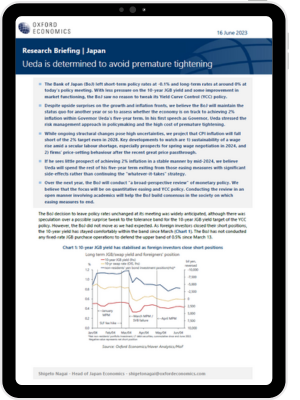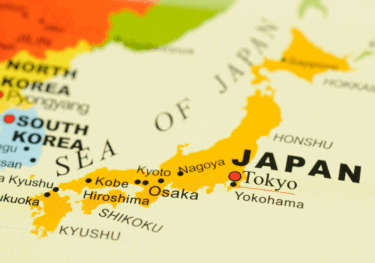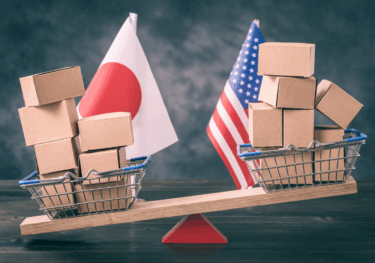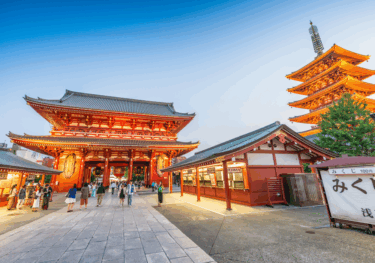Japan: Ueda is determined to avoid premature tightening

The Bank of Japan (BoJ) left short-term policy rates at -0.1% and long-term rates at around 0% at today’s policy meeting. With less pressure on the 10-year JGB yield and some improvement in market functioning, the BoJ saw no reason to tweak its Yield Curve Control (YCC) policy.
Despite upside surprises on the growth and inflation fronts, we believe the BoJ will maintain the status quo for another year or so to assess whether the economy is on track to achieving 2% inflation within Governor Ueda’s five-year term. In his first speech as Governor, Ueda stressed the risk management approach in policymaking and the high cost of premature tightening.
What you will learn:
- While ongoing structural changes pose high uncertainties, we project that CPI inflation will fall short of the 2% target even in 2028. Key developments to watch are 1) sustainability of a wage rise amid a secular labour shortage, especially prospects for spring wage negotiation in 2024, and 2) firms’ price-setting behaviour after the recent great price passthrough.
- If he sees little prospect of achieving 2% inflation in a stable manner by mid-2024, we believe Ueda will spend the rest of his five-year term exiting from those easing measures with significant side-effects rather than continuing the “whatever-it-takes” strategy.
- Over the next year, the BoJ will conduct “a broad-perspective review” of monetary policy. We believe that the focus will be on quantitative easing and YCC policy. Conducting the review in an open manner involving academics will help the BoJ build consensus in the society on which easing measures to end.
Tags:
Related posts

Post
Tariffs and Politics Leave the BoJ Powerless in Japan
The Bank of Japan kept its policy rate at 0.5% at its July meeting. We continue to think the BoJ will exercise caution on rate hikes despite still-high inflation and a recent trade deal with the US.
Find Out More
Post
US-Japan Trade Deal Fails to Shift Japan’s Growth Outlook
We estimate that the US's effective tariff rate on Japanese products is around 17%, in line with our baseline assumption. Lower tariffs on autos are a positive, given the sector's significant contribution to the economy and its broad domestic supporting base
Find Out More
Post
Japan’s Rising Political Instability Will Undermine Fiscal Discipline
The ruling Liberal Democratic party (LDP) and its partner Komeito lost their majority in Japan's upper house elections on July 20. Although Prime Minister Shigeru Ishiba will likely stay to avoid political gridlock, especially to complete tariff negotiations with the US, the political situation has become fluid and could lead to a leadership change or the reshuffling of the coalition.
Find Out More